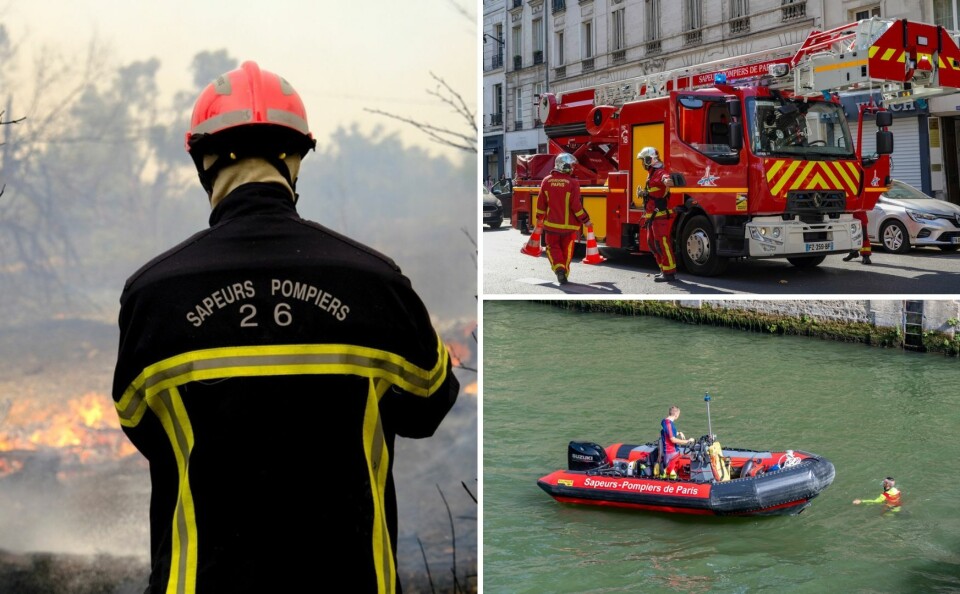-
What is ideal calendar donation for French firefighters and postal workers?
There is no set price for the calendars, which are sold in workers’ spare time
-
Firefighters, postal workers, rubbish collectors: Alert on calendar scams in France
Many professions offer calendars at this time of year - but not all sellers who visit your home are genuine
-
Firefighters’ strike over work rules is 'unprecedented’ in France
Nine unions unite over protest action for first time
Chemical accidents, airport standby: 10 duties of French ‘pompiers’
We look at the varied roles of ‘sapeurs-pompiers’ (firefighters) and how they keep us safe

Firefighters are called pompiers, from the French verb ‘to pump’ (pomper).
This harks back to the era in which pumping water into their hosepipes was a central element of their activities. They are also often referred to as soldats du feu.
Today, there are 252,700 sapeurs-pompiers in France: 41,800 of them (17%) are salaried professionals but the vast majority (78%) are volunteers.
There are also 13,200 (5%) military firefighters. Some 20% of civilian firefighters are women.
From evacuating areas threatened by forest fires to overseeing daring ravine rescues, their job can be hugely varied.
Read more: What numbers should I dial in an emergency in France?
Here are some of their roles:
1. Emergency calls
In 2021 (latest data available), firefighters answered 4,680,900 emergency calls and attended 254,200 fires.
Many other calls were for car accidents (in 2022, 3,267 people died on the roads and 236,834 were injured.)
Read more: 114 emergency number helps if you cannot communicate easily in France
2. Airport role
Specially-trained firefighters are on standby during the take-off and landing of every commercial flight in France.
3. Medical aid
Pompiers also answer emergency medical calls: 85% of attendances are to help people who are ill, injured, intoxicated or drowning.
When required, they can mobilise doctors, nurses, pharmacists and vets from a national list of 12,523 professionals in the service de santé et de secours médical (SSSM) as first responders to an emergency call.
4. Specialist training
According to their geographical location, they receive specialist training to rescue people from mountain ravines, rivers and lakes, and underground spaces.
They can also call on divers, dog handlers and special teams – to cut people out of train wrecks, for example.
Read more: France appeals for volunteer firefighters
5. Fighting fires
Actually fighting fires accounts for only 6% of emergency responses, and most of these are house fires.
The rest, in descending order, are fires on the roads, burning vehicles, and wildfires.
Read more: Checks, fines, help: rules for clearing undergrowth around French home
6. Tackling forest fires
As well as fighting forest fires, pompiers direct efforts to prevent them, by controlled burning of undergrowth, for example.
They also advise local administrations on preventative measures, including the need to keep land cleared, where to locate water cisterns and how to construct fire breaks.
In partnership with the Office National des Forêts (ONF), pompiers organise patrols of sensitive areas.
They also run events aimed at raising awareness among the general public of the dangers of forest fires, and how to prevent them.
Most forest fires (98%) are contained before they spiral out of control, burning less than 10 hectares of land. The remaining 2% of fires are responsible for 90% of the annual damage caused by forest fires.
Firefighters are also responsible for evacuating people whose homes are threatened.
Read more: Homemade garden fire protection system in France
7. Minimising pollution
Minimising environmental pollution is a priority.
This means that when they use chemicals to put out a fire, they ensure these are removed after, rather than left to wash away into streams and rivers.
8. Chemical accidents
Pompiers deal with pollution such as uncontrolled discharge of dangerous industrial waste.
This might include leaking gases, chemicals or accidental explosions.
The Cellule Mobile d’Intervention Chimique et Radiologique (CMIC-CMIR) has specially trained teams to tackle industrial fires, pollution, and accidents involving hazardous chemicals or radioactive substances.
9. Animal rescues
Firefighters save animal as well as human lives. In the case of extreme high tides, for example, they intervene to evacuate animals from the danger zone.
10. Youth initiatives
Schools can offer courses training young people to join the Jeunes Sapeurs-Pompiers (JSP).
These range from first aid to formal preparation to enter the competitive exams to become a professional.
Pompiers are always looking for recruits. To join as a volunteer, contact your local brigade. Training is free and you are paid for attending call-outs. You do not need to be French.
Related articles
What to do (and not do) during heavy rain and flood alerts in France
Tips to help avoid chimney fires as numbers increase in France
La Poste, fire service: where does money from calendars go in France?
























